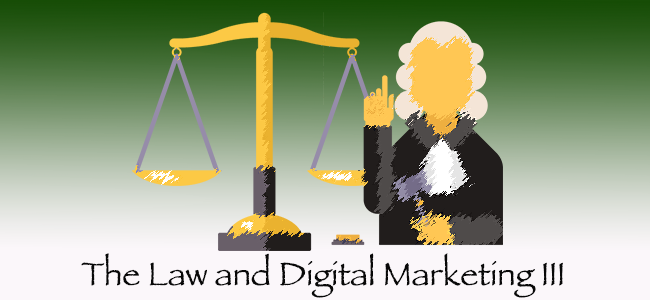
This is the final article of a three-part series looking at the laws relating to digital and social media marketing. As mentioned previously the focus will be on the UK (elements of which will be similar to other European countries): if you are from another part of the world then use this as a guide for future consideration.
There eight elements I will be considering in the series, not all of which relate to specific statutory powers:
- Copyright, Designs and Patents Act 1988 (see part I).
- Data Protection Act 1998 (see part I).
- Privacy and Electronic Communications Regulations (EC Directive) Regulations 2003 (see part I).
- The Companies (Trading Disclosures) Regulations 2008 (see part II).
- Social Media and the law(see part II).
- Electronic Communications Act 2000.
- Committees of Advertising Practice (CAP).
- Filming
In part three I will be providing an overview to the Electronic Communications Act 2000, the regulations associated with the Committees of Advertising Practice (CAP) and things to consider when filming.
Electronic Communications Act 2000
The Electronic Communications Act 2000 is designed to enhance confidence in the process of electronic communications, the Act implements certain provisions of the Electronic Signatures Directive (1999/93/EC). It forms a legal framework that supports electronic communications and transactions between organisation (private and public sectors) and is utilised by the Electronic Signatures Regulations 2002 and the Electronic Commerce (EC Directive) Regulations 2002. It is made up of 3 parts:
Part 1 – Cryptography Service Providers. This is essentially a voluntary approval scheme for organisations who provide a cryptography services (i.e., electronic signature and confidentiality support services) to businesses and the public. The body running it (in the UK) is tScheme. The list of members is not great, but there are other bodies that organisations have affiliated themselves to like Webtrust: so if you are seeking to engage Cryptography Service Providers make sure it is associated with a recognised body.
Part 2 – The facilitation of electronic commerce, data storage etc. Here a court (in the UK) assess the validity of the electronic signature and decide if it has been correctly used. The legislation aims to be technology-neutral and covers all types of electronic signature. Some of you may be thinking that this does not apply to you, however your email signature block in Outlook could be deemed by the courts as your affirmation to do business.
Part 3 – Telecommunications licences and supplemental. This is no longer in force as it has been replaced by the Communications Act 2003.
(Source: The Department of Trade and Industry, Information Security: Guide to the Electronic Communications Act 2000)
Committees of Advertising Practice (CAP).
The Advertising Standards Authority (ASA) is the UK’s independent advertising regulator. The ASA makes sure ads across UK media stick to the advertising rules (the Advertising Codes). These codes are written by the Committee of Advertising Practice (CAP) which is the sister organisation of the ASA. The details of each code can be found here. In summary, there are two types of codes, broadcast code and non-broadcast codes
Broadcast Code
The UK Code of Broadcast Advertising (BCAP Code) applies to all advertisements (including teleshopping, content on self-promotional television channels, television text and interactive tv ads) and programme sponsorship credits on radio and television services licensed by Ofcom (the details can be found here)
Non-Broadcast Codes
UK Code of Non-broadcast Advertising and Direct & Promotional Marketing (CAP Code) is the rule book for non-broadcast advertisements, sales promotions and direct marketing communications (the details can be found here).
Filming and the law.
In the UK there are no copyright issues relating to the filming of individuals. That said, the filming of an individual could be interpreted as “personal data” under the Data Protection Act 1998, and its display would also have implications under the privacy provisions of the Human Rights Act 1998. Under the Data Protection Act 1998, an organisation (in this case the filmmaker) is obliged to process personal data “fairly and lawfully”. Where the name and image of a person are linked – or are capable of being linked – then the person can be identified and the image should be regarded as personal data. If a dispute occurs it is likely that a court would have to decide if the said individual is identifiable. The filmmaker should obtain written consent of the persons being photographed, where children or minors (under 18 years) are involved then the permission of the child’s parent, guardian or carer will need to be obtained. You should create a standard consent form which the person being filmed will sign. In general the filming of crowds should not be an issue, but be aware of how others might interpret the context of the scene.
If the scene is judged to be defamatory then you could face civil action. Defamation is governed by common law and statute law (see Defamation Act 2013 (the Act)). In filming, it occurs when the film is published to a third party (including social media) depicting ‘an untrue imputation’ against the reputation of individuals, companies or firms which serve to undermine such reputation in the eyes of the general public.
This ends the review of digital and social media marketing in relation to the law, although I have focused on those statutes associated within the UK you should, if you are from another country consider the implications in your own territory. Much of what I have explained is common sense but you will be surprised how many organisations fail to adhere to the simple points. If there is one key take away that I would like you to remember then it is to produce a set of policies, that takes into consideration the local laws, for your staff.
Disclaimer:
We at Strategic Planet are not lawyers, when embarking on an exercise involving any of the above we recommend that you take qualified legal advice.
Alan Shaw
Latest posts by Alan Shaw (see all)
- What is social listening and why it is an important tool for researchers? - July 31, 2021
- COVID-19 and Remote Learning: Experiences of parents supporting children with SEND during the pandemic. - June 30, 2021
- Using Netnography To Evaluate The Launch And Collapse Of The European Super League - April 21, 2021
- Developing Semi-Structured Interview Questions: An Inductive Approach. - April 9, 2020
- Developing Semi-Structured Interview Questions: A Deductive Approach - April 9, 2020














